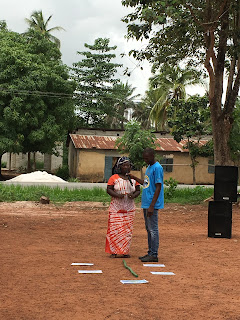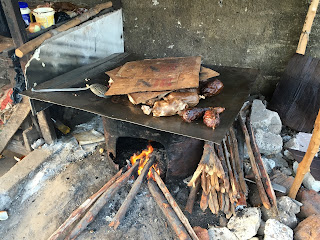Curious what an actual day has looked like for me so far? Wonder what I really mean when I say: I'm doing research? Well here's an example of one of the more "typical" days so far:
7:00 am - Woke up after 5 hours of sleep. (Jet lag!) Quickly showered. Consolidated notes on my methodology and preliminary findings for an adolescent sexual and reproductive health (ASRH) literature review I've been working on, where I am looking for all the academic articles I can find that talk about teenage girls' thoughts, decisions, and behaviors around sex and childbearing.
7:30 am - Had a phone conference with a research scientist from Harvard to discuss my progress on the ASRH review. Realized that the U.S. is four hours behind, not ahead. Major oops!
7:45 am - After making some tea, sat down at my dining room/work table. Checked my email and saw a draft of the translated version of my research project protocol, completed in less than 48 hours! (Thanks Patrick!) Started to review the French version and make corrections in preparation to submit my research proposal to Guinea's Ethical Research Committee, which is a first step before I can even get permission to do my research here.
8:15 am - Identified two qualitative research guides in French in order to learn and apply the correct technical vocabulary for my research methodology. (For example, "Snowball sampling" has meaning to me as qualitative researcher in English, but there is a specific way to say "the method of sampling of the ball of snow" in French.)
9:00 am - Too much French! Switched gears and started revising and editing one of my related dissertation papers that looks at how the early marriage of girls affects health.
9:45 am - Meeting to discuss some home/office logistics and to start identifying things I still need to purchase. Also took a moment to update the summer budget.
10:15 am - As I was editing and updating my research protocol, some ideas for my research started to come to mind. I started drafting a research memo, which I often write to reflect on any ideas and processes so that I am aware of what (and how) I was thinking about any of the work I do at a given point in time. I was able to refine the introduction section of my research project and spent some time writing the intellectual, practical, and personal reasons I selected Guinea for this research. For example, the devastating impact of Ebola and limited research being conducted in Guinea made it an important country to learn and share more about, while my own interest and experience in Francophone African countries I hope will make the transition here smoother.
11 am - Back to editing the French translation of the research protocol. Also took a quick break for a homemade mango and avocado salad.
1 pm - Catching up on emails, and might have a local research partner lead! Started updated updating my CV, as requested.
2 pm - Final revisions to the protocol. Also made some phone calls in preparation for tomorrow. Treated myself to a cup of tea and some biscuits (the British form of a "cookie").
3:15 pm - The real conference call to discuss progress on the ASRH review. So far, it's been really useful to do some preliminary literature review on how marriage, contraception use, abortion, and abstinence following childbirth impact fertility and childbearing for teenage girls throughout the African context. I haven't found any articles from Guinea though. I can already see how this is influencing my thoughts about this summer's projects and gaps that can be filled.
4 pm - I see another email from a potential local partner, which could be very valuable in furthering this summer's proposed project. Made notes on what needs to be done tomorrow, and took some time to jot down daily reflections.
4:45 pm - Took 45 min to start drafting my next blog post. Treated myself to a glass of wine while preparing dinner.
(I won't bore you with the details on the rest of the day, but I did a few more hours of article searching, watched some French TV, and had enough internet speed to make an international call.)
I'll update you on some of my findings as I go along, and will share some of my non-office days as those start to emerge.








































